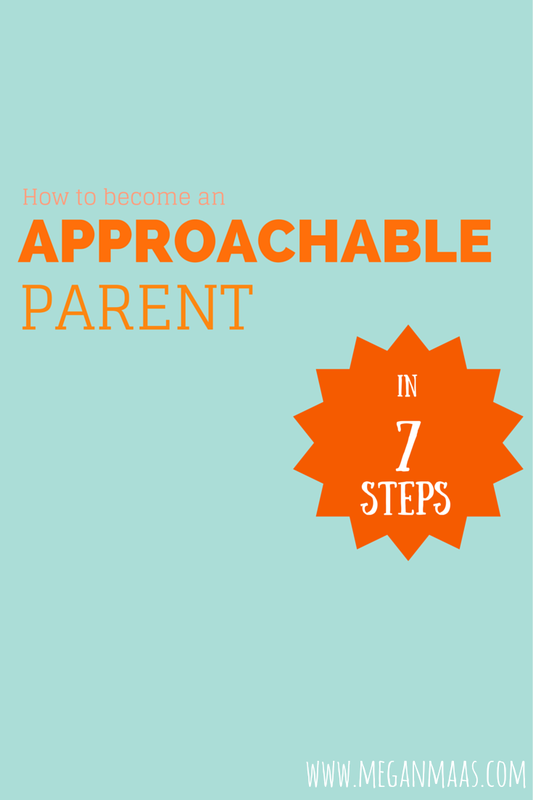|
Working as a sexuality educator, I am often asked questions like, “How do I talk to my child about sex?” and “What do I say to my child about pornography?” Yet, there really is no right or wrong way to answer those questions. There are (of course) better answers and worse answers to those questions, and evidence-based answers to those questions, which I will share in a later post. But the advice I am most comfortable doling out, is to prioritize becoming an approachable parent. In other words, you want to learn how to listen to your kids talk about sex, not just learn what to say to them about sex.
If your child does not already come to you with their emotional and relational concerns about friends and romance, it is likely that your child does not perceive you as an approachable parent. It could also be that your child is introverted or something, but because you only have control over your own behavior, let’s start there first.
With the exception of masturbation, sexual behavior is relational behavior. Although we typically research sexual behavior on an individual level, sex primarily involves two people deciding to engage in some type of sexual behavior together. So, whether that means your child will be negotiating condom use with a short-term partner (who will buy it, who will put it on, when will he/she put it on) or negotiating satisfying sex with a long-term partner (discussing what he/she likes, asking what his/her partner likes, what he/she doesn’t like), learning how to comfortably initiate and execute sexual conversations is a life skill that is better mastered sooner rather than later. Regardless of your pre-marital sex beliefs. One of the ways your child will become comfortable having sexual conversations now or in the future, is through practicing with you. The majority of research finds that parent-child communication about sexuality yields safer sexual behaviors in adolescents such as condom use, contraception use, and delayed onset of intercourse (1, 2, 3). Most likely because it increases efficacy in your child to take the necessary steps to prioritize their health (4). But it can be difficult to initiate conversations about sex. So, how does one get started? You start by listening to what your child is already saying. Really listening. And then you can start talking, once your child feels heard. Even if you have some embarrassing moments, even if you don’t have all the answers, even if you say something that is incorrect and need to correct yourself, your child is better off because you’re prioritizing listening over lecturing to her. If you are concerned that your child may be pregnant, may have gotten someone else pregnant, may have been sexually abused or assaulted, or may have sexually abused or assaulted someone else, you need to address your concerns immediately. You can access resources to do so here. If you do not have any of these concerns, you’re ready to prioritize ‘becoming approachable’. Here are 7 ways to try approachable parenting on for size: 1. Know your own perspective on sexuality. Are you comfortable talking about sex? Are you confident in your own sexuality? If not, practice sexual conversations with a partner, relative, or friend. If you waiver at all when you say these words or phrases: “Penis, vagina, vulva, testes, oral sex, anal sex, vaginal sex, fellatio, cunnilingus, or penetration,” you may lose some of your credibility. Like a shark to blood in the water, your kid will sniff this discomfort out so quickly, that he or she will do anything in his or her power to avoid such an awkward situation ever again. A fun way to tackle this issue in your family is to play a little game I like to call “Dramatic Anatomy”. You can print out a list of anatomically correct body parts here and as a family compete against each other to win in all of the categories. You end up saying: uterus, penis, fallopian tube, perineum, etc. in scared, happy, disappointed, excited, embarrassed, etc. voices. Then you vote on who did the best “depressed perineum” or “happy uterus”. 2. Act calmly even if you aren’t. Imagine you are watching a TV show with your child and there is a steamy sex scene between two characters who don’t know each other and obviously did not use a condom. Do not react. You may be sweating it, thinking, “This is a teachable moment! Oh crap. What am I supposed to teach here?” Instead, just breathe. After the show is over you can ask your child “What did you think about John having sex with that random girl?” Hopefully, your child will say something like, “I know! They barely knew each other!” or will give you some indicator of risk. But he or she will probably shrug and annoyingly say “I don’t know.” You can then respond with something like, “It just seemed so out of character for him, they barely knew each other.” And leave it at that. This doesn’t mean that you condone unprotected or uncommitted sex, it just conveys to your child that if these subjects arise, you will remain calm. Believe it or not, you just capitalized on a teachable moment by establishing yourself as approachable. You initiated a sexual conversation, and when your child responded to your question, you did not punish him for his opinion or lack thereof. After you’re sure your child perceives you as approachable you can go more into depth about safety when those moments arise. 3. Practice active listening skills. Don’t focus on what you should be asking your child. For example, the worst way to start a conversation would be with either of these questions: “Are you having sex?’” or “Are you watching pornography on the internet?” Instead, focus on how you respond when your child is talking to you about any emotionally charged issue. This means nodding your head, saying “uh-huh”, or giving other verbal or non-verbal cues that you really are listening to understand, not listening just to respond. The other biggie-no interrupting! Research shows that mothers become more authoritative during sexual conversations (5), but you actually do not want to do this if you want to encourage an on-going dialogue about sexuality with your child. 4. Don’t assume heterosexuality. This is a big one and unfortunately, a new one for our culture. This may be something you’ve already been doing since your child was young, but if you have been assuming your child is heterosexual his whole life, it is ok to change your tune. This can be as easy as saying “romantic partner” instead of “boyfriend” or “girlfriend” or “Do you have a crush on anyone?” instead of “Do you have a crush on a particular boy/girl?” For more information on becoming a sensitive parent for LGBT youth, check out my resource page here. 5. Prioritize support over judgment. If your daughter comes to you because she is afraid she is pregnant, tell her something like, “Wow. I am so glad you came to me about this. Although this is not easy for me to hear, I am more worried about you. How are you feeling about this?” Then try your best to assure your child you will be there every step of the way to manage the outcomes of her decisions. The worst way you could react is with judgment. “How could you do this?” or “You know this against our beliefs!” Now is not the time for that. Your job is to establish yourself as the safest place in this journey. 6.Try self-disclosing about your own sexual experiences during adolescence in an age appropriate way. Research has shown that more maternal disclosure about sexual experiences is linked to adolescents’ more conservative views about pre-marital sex (6). If you weren’t sexually active in adolescence, talk about the pressure you felt to have sex or to remain abstinent. If prom (or the 8th grade graduation dance) is coming up say something like, “Geeze, I remember my prom (or 8th grade graduation dance). I felt so much pressure to have sex (or make out) with Dean. I guess that is just kinda cliché-huh?” There is no guarantee this phrase will get you anywhere, but I’m sure you can think of phrases that would reveal a little bit about your own experience that your child may respond to. 7. Use humor when possible. I wish sex wasn’t embarrassing, but in our culture, it is. So, it’s okay to laugh a little and to try to use humor when possible. Teen pregnancy, STIs, and sexual assault are serious issues, but dating, romance and sexual behavior are quite funny. If you step back and look at the big picture from the awkwardness, to the noises, smells, cultural customs, there is a lot of laughter to find in it all. Laughter will help you and your child both get comfortable about sex and the conversations can flow from there. (1) Eastman K.L., Corona R., & Schuster MA. (2006). Talking Parents, Healthy Teens: A worksite-based program for parents to promote adolescent sexual health. Prevention of Chronic Disease, 20, 123-141. (2) Clawson C.L. & Reese-Weber M. (2003). The amount and timing of parent-adolescent sexual communication as predictors of late adolescent sexual risk-taking. Journal of Sex Research, 40, 256–268. (3) Miller K.S., Levin M.L., Whitaker D.J., & Xu X. (1998). Patterns of condom use among adolescents: The impact of mother-adolescent communication. American Journal of Public Health, 10, 1542–1544. (4) Bandura, A. (2004). Health promotion by social cognitive means. Health Education Behaviors, 31, 143-164. (5) Lefkowitz, E.S., Kahlbaugh, P., & Sigman, M. D. (1996). Turn-taking in mother-adolescent conversations about sexuality and conflict. Journal of Youth and Adolescence, 25, 307-321. (6) Romo, L.F., Lefkowitz, E. S., Sigman, M., & Au, T. K. (2001). Determinants of mother-adolescent communication about sex in Latino families. Journal of Adolescent and Family Health, 2, 72-82. Photo Source: Dollar Photo Club
4 Comments
Belinda
3/5/2014 02:14:27 pm
wow, Meggie, that is so insightful and right on. Love your commitment to knowing and sharing it all. I just wonder how you got so much insight? It is something I would expect from a tried and true Mother/Grandmother. Like me, except I don't know that much!!!! lv.
Reply
Elizabeth Hoffmann
11/29/2014 09:48:26 am
Thank you so much. This is very helpful.
Reply
Robin
3/23/2016 03:24:07 pm
Love this! Thanks for writing.
Reply
Leave a Reply. |
About this Blog:I'm here to help us discuss sexuality, gender, and media by integrating information from academic and mainstream sources. I hope this resource produces more sexually competent people who raise sexually competent kids. Categories
All
|



